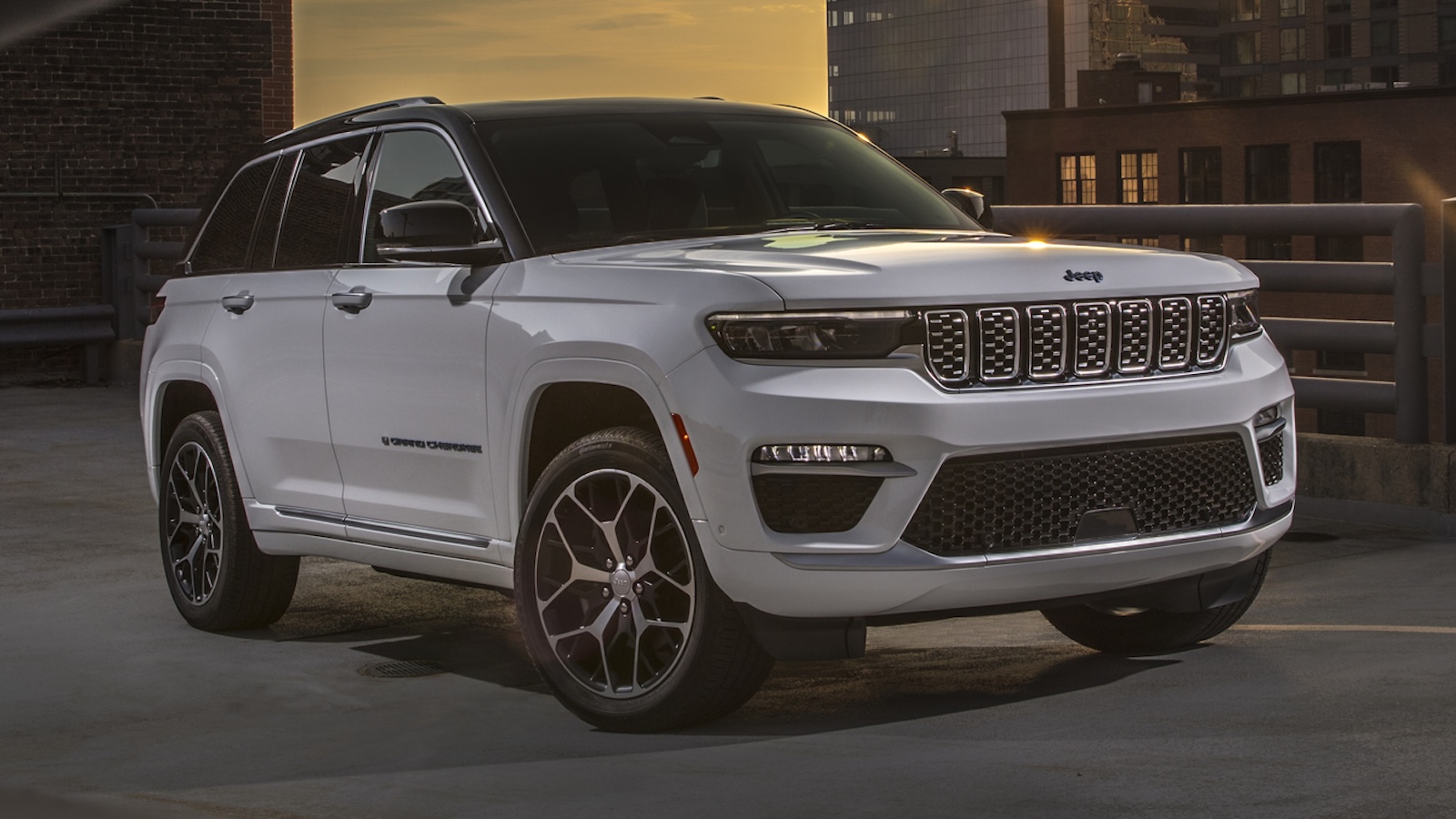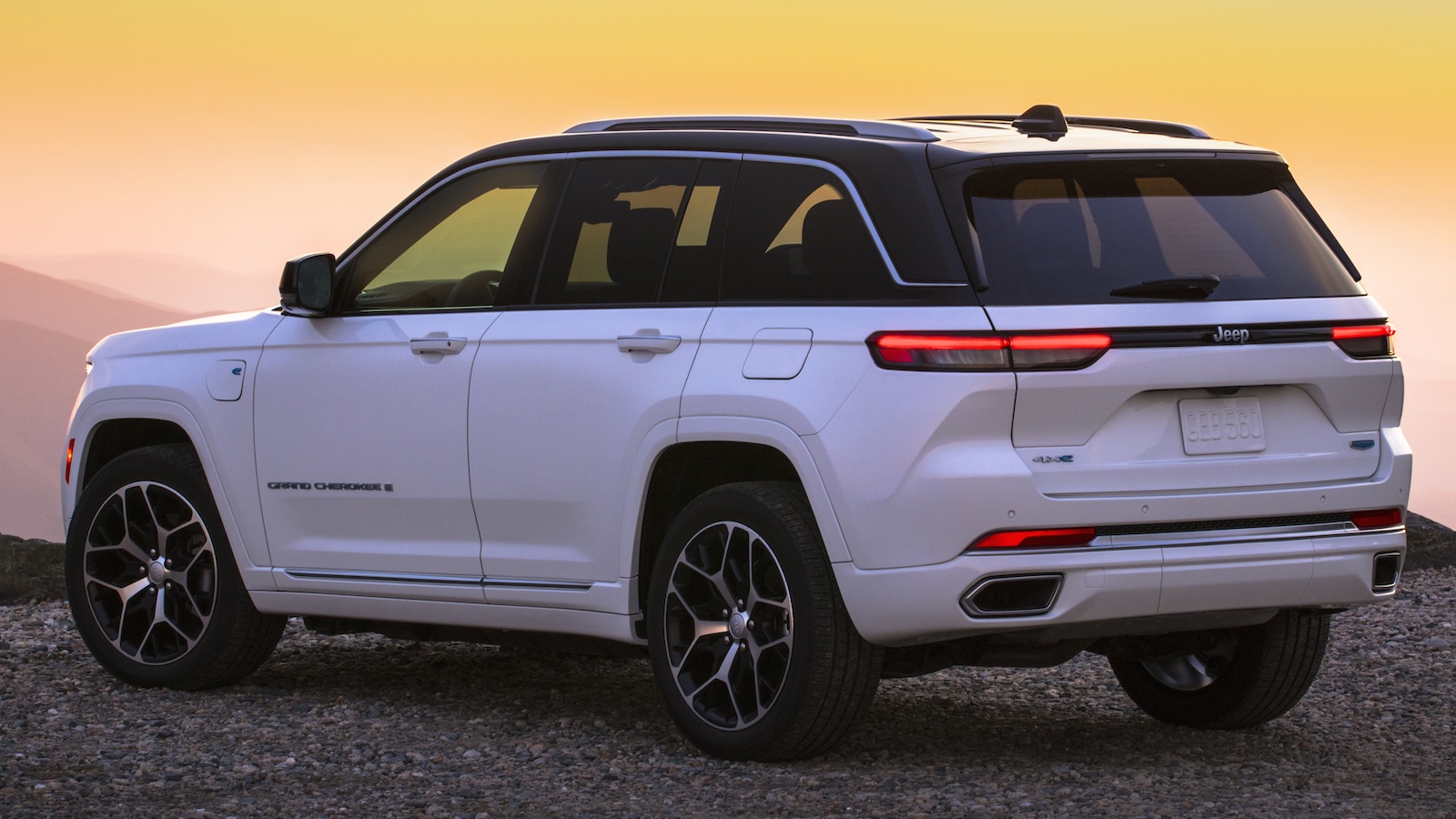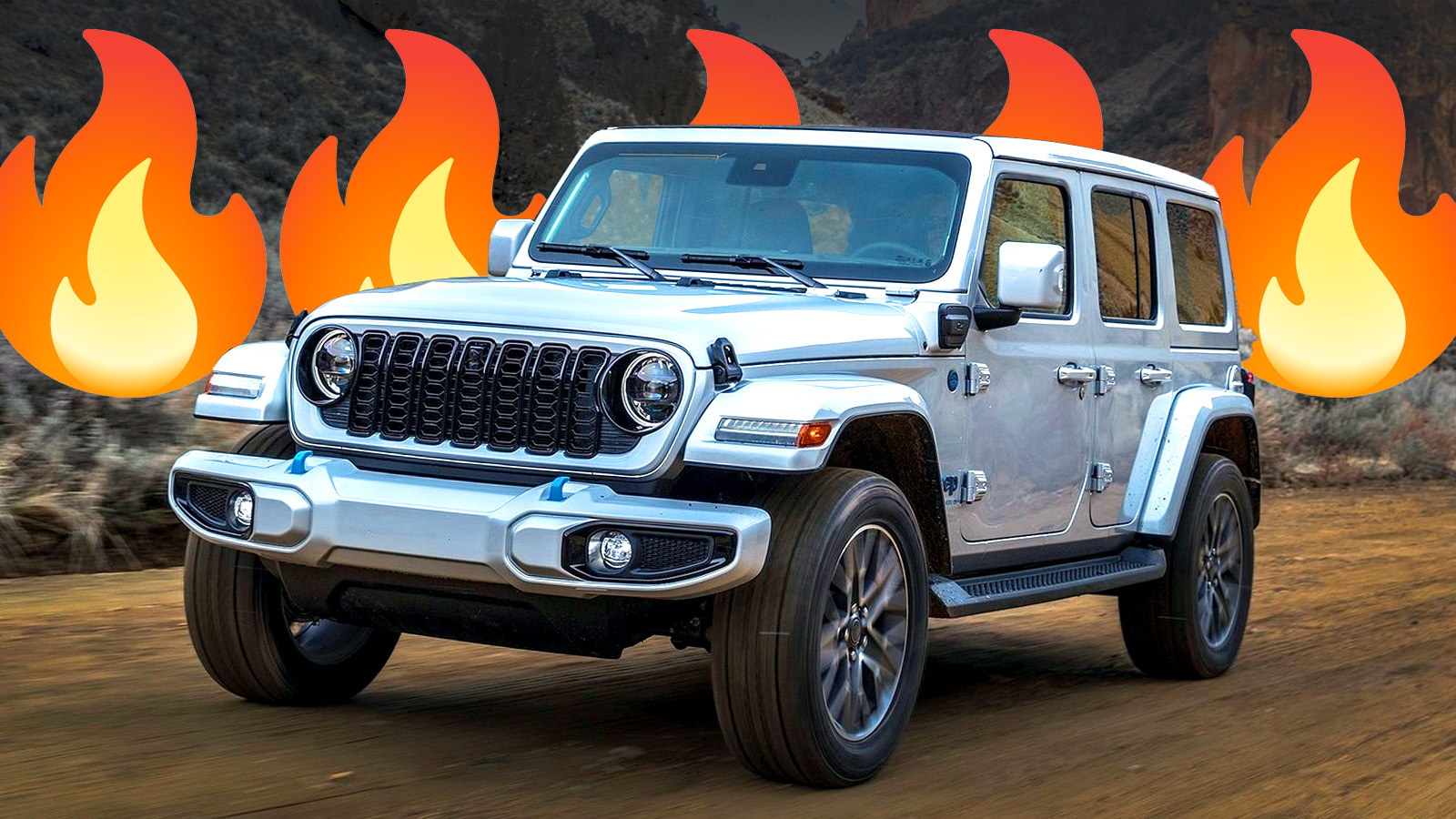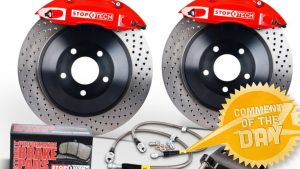It hasn’t been a great quarter to be a hybrid Jeep owner. Hot on the heels of a major battery pack recall, the Stellantis brand has announced it’s recalling 2023 to 2025 Grand Cherokee 4xe plug-in hybrids and 2024 to 2025 Wrangler 4xe plug-in hybrids due to potential engine fires. The culprit? Sand.
Yes, sand. See, when an engine block is cast, sand is used to allow for voids in the casting. Think cylinders, cooling passages, and the like. Once the molten metal solidifies and cools off, the sand is removed. Or at least, it should be removed. According to the official communication for recall 78C, not all of the sand may have made it out of each engine.
Some of the above vehicles may have been built with an engine that may be contaminated with sand from the casting process. Sand from the casting process can contaminate internal engine components, leading to a catastrophic failure, which can result in a vehicle fire or an unexpected and unrecoverable loss of propulsion.
Fundamentally, we’ve seen similar recalls before from Toyota with its turbocharged V6 and Hyundai with some of its Theta II four-cylinder engines. However, that doesn’t make experiencing an engine failure any less nerve-wracking. Mind you, the Transport Canada recall filing makes it sound like engine failure on affected two-liter turbocharged four-cylinder engines isn’t sudden. According to the document, “the engine could make abnormal noises and a warning light may turn on. If you continue to drive the vehicle with these symptoms, the engine could fail.”

Interestingly enough, many Jeep plug-in hybrids covered under this latest recall are already affected by recall 68C, which concerns cells in the high-voltage battery pack being susceptible to separator damage. What happens when the separator in a cell is damaged? Well, among other things, fire is possible. Yes, this means some vehicles now have two separate known sources of fires. Quite unusual, all things considered.

Jeep is already aware of 36 engine fires and 50 on-the-move engine failures linked to this defect, and it sounds like owners of affected vehicles could be facing more logistical headaches than expected. While 4xe models affected by the battery pack recall are already under advisory to be parked outside and not charged, Jeeps affected by this latest engine recall are under a do-not-drive notice in Canada, which has the potential to spread south of the border.

So, if you own one of the 112,859 affected plug-in hybrid Jeep models in America or one of the 5,658 affected examples in Canada, it’s probably safest to just park it for now. As it stands, there’s no firm date on when a fix will be available. Given how owner notification isn’t expected until Dec. 29, you could be looking at a wait into the new year.
Top graphic images: Jeep; iOS









911 What’s your emergency.
My jeep is on fire! It’s one of those new electric ones like Eli Manning drives!
Sir, is the engine or the battery on fire, the fire department will need to know.
Uh, it’s a jeep thing, you wouldn’t understand.
“jeep thing, you wouldn’t understand” is code for “I’m so sick of this thing failing and having recalls, that I set it on fire myself, but don’t want to admit to the arson”?
My brother has a wrangler 4xe, he has a very short commute so he almost never uses the engine, it is an improvement comfort wise over is old 2016 car. He also likes it better than his old 96 4 cylinder wrangler, but he also made the call to take the crazy cheap lease deal from jeep they ran earlier this year to get them off lots. I saw him this weekend and he is fine with what ever recalls or failures. All it means is they give him a loaner while they fix his jeep, and the miles to an from the dealer are not counted against his total.
Jeep is going to have a lot of off lease cars in a few years that will be a real drain on them value wise.
Fiero developed it’s reputation for less than this…
I know the internet can make problems seem more severe but damn, r/4xe is just ridden with lemon law and recall posts.
Sand in the castings. That’s funny.
I love US manufacturing. And I especially love the Meth Belt manufacturing facilities in Michigan, Indiana and Ohio, where worldclass skilled labor and manufacturing techniques are making america great again!!
And that bumper looks like it would fit on a 1978 Lincoln Towncar.
It’s everything to do with corporate culture. Garbage is made everywhere.
^ That. This is a matter of Chrysler/Jeep/Stoolantis making garbage products. The Japanese companies that manufacture in the midwest make pretty solid vehicles.
Not denying that. BUT, we, in the US, have been in a race to the bottom in education, work ethic, manufacturing talent, and worker pay.
Having lived and worked in East Asia, I am impressed with the generally high level of cultural pride people have in their work. I haven’t seen that here in the US for about 40 years. Of course, I generalize.
When I lived near South Bend/Elkhart Indiana, the RV manufacturers had hilarious worker turnover and absenteeism. They scraped the bottom of the barrel for employees. And the quality products they churn out speak for themselves.
Honda’s plant in Marysville, OH is impressive, but staffing concerns still abound. Not too sure about the quality of product coming out of Alabama, but I am leary.
Just happy that my vehicles were all manufactured in Japan.
But it’s much more convenient to blame the unions and the Japanese/Korean/Chinese competition!
Couldn’t agree more. “Made In America” used to mean quality products made by people whose careers depended on making quality products, who had pride in their work. As with everything else, that label has been hollowed out and sold to the cheapest labor available. I (as an electrician) hate installing American-made light fixtures because they’re regularly poorly assembled or broken from the factory. I (as a union member) hate preferring foreign products, but that’s what happens when you devalue manufacturing positions from ‘a career you can raise a family on’ to ‘a job marginally better than working in fast food’. Of course, they still cost more to the consumer.
Case in point: I purchased replacement windows over the summer through a big box retailer. Best windows for the price, and selling point was Made in America!! 12 weeks later they were installed. The next week I noticed so many flaws and defects, in build and installation, that manufacturer and regional install rep came out to inspect them. RESULT: 75% are defective and need to be replaced. Good design, assembled by buffoons, installed by morons. All American.
When Jeep came out with the plug-in hybrid I was like hey maybe that’ll work for me, but then saw it had weak sauce motors and no range and was like..what’s the point? Apparently keeping mechanics employed was the point, lots and lots of mechanics employed.
But seriously, between this and the Charger EV, and have you seen Marques shade on the Wagoneer S? It’s like Stellantis thinks it’s 2015 and compliance EVs are all the rave.
They need to lean into this. I’m imagining a tie in with Burger King. You know – flame broiled.
New BK/Jeep lithium-grilled burgers! You’ll feel great in a month!
AT BEEEEEKAY, RECALL YOUR WAY! YOU RULE!
I’m impressed the 2022 Grand Cherokees somehow skipped this one.
While I have dealt with many issues on 21st century VWs over the years, none of them involved two different ways the car could spontaneously combust. I know beating VW reliability is a low bar…but Jeep is working their way down towards it.
Failure to remove the sand before installing the engine has to be the equivalent of failure to remove the plastic wrap from a slice of American cheese when making a sandwich or remove the innards from a Turkey before cooking on Thanksgiving.
It really is. Having done zero-stakes metal casting in my backyard, I can tell you this is unacceptable even at my level.
For Jeep EVs and Hybrids are the devil’s work. All fire and brimstone. (Kidding! Just kidding! Don’t come at me with pitchforks.)
So would it be rude to suggest Stellantis send every 4xe plug-in hybrid owner a special pack containing marshmallows, chocolate bars and some graham crackers, just to keep them busy in the event they’re waiting by the side of the road for the fire truck/wrecker? Everyone loves s’mores!
Wow great idea a fire truck wrecker. You need to patent that
If they did that, it would include paperwork saying that opening the box constitutes you accepting an agreement to waive all legal rights to sue over the 4XE issues.
In fine print on the inside of the front wall. Nobody will spot it.
Hmm, it’s going to be winter soon. Parking a vehicle with a removable top outside for long periods of time without moving it seems like a terrible idea. Forget about the HV battery, that’s getting replaced anyhow. I’d be concerned with a seal failing and trashing the interior while waiting for a fix. Or rodent damage. Stellantis should skip to buying these back, fixing them properly at the factory and then auctioning them off to dealers to sell as used.
They’re never going to willingly buy these piles back. They’re going to have to be forced, so the Canadians may eventually get a buyback, but the US customers wont any time soon.
So, your talking having a fire sale?
Well played!
In the immortal words of Arrow as popularized by Buster Poindexter (David Johansen), Jeep PHEVs are “ Hot, Hot, Hot!”
I thought Ford had recall problems…
Oh, wait, they still do.
These jeep recalls aren’t anywhere close to everyone who buys a Ford gets a recall
Or maybe Ford buyers get, I don’t know, 8 recalls. I think that’s how many my Maverick has had.
We’re any of them for the Maverick catching on fire?
Well, there was one for a catastrophic engine failure that could result in fire (as well as being stranded in traffic). The remedy was a software patch and a free engine if it blows up in IIRC 10 years.
Tempting to maybe have the engine blow up at 9.5 years.
Maybe it’s just hearing about it more now, but why is clearing engine castings seemingly such an issue with multiple manufacturers lately? Are passages getting too small and convoluted that they don’t clear adequately with traditional methods or did they alter the process in some way to save time?
QC?
Shareholders don’t need no QC.
Not enough HB1 Visas have to hire the unemployedigrants.
Why not both?
Quality is job
To some degree, yes. Engine castings are continually getting more complex as more unique coolant passages are added to adequately cool exhaust manifolds integrated into the head, to separate the oil and cooling channels for the block and various sections of the head, to add oil galleys for switchable cam mechanisms, cam phasers, turbo oil feeds etc, which all means more unique, convoluted sand cores trying to weave around one another in the same casting.
The bigger driver inevitably is cost though, in this case as processing time, whether it’s thoroughly inspecting sand cores for defects before casting, the number of rinses after casting, etc
This would be comical if owners weren’t suffering because of being unable to use them.
I will never understand why Jeeps are still a thing. They have been flaming piles for decades, yet people still buy them.
Takes “Mopar or No Car” too seriously.
Yes maybe change it to Mopar and you have no car.
Hey Jeep…well done.
Very good.
Ha, I get it. Like crispy fries.
In the past this would have been quite rare.